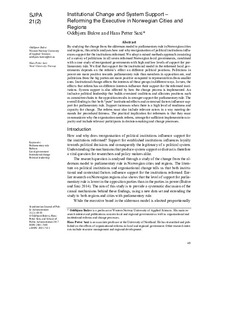| dc.contributor.author | Bukve, Oddbjørn | |
| dc.contributor.author | Saxi, Hans Petter | |
| dc.date.accessioned | 2017-11-09T07:33:00Z | |
| dc.date.available | 2017-11-09T07:33:00Z | |
| dc.date.created | 2017-08-10T15:49:10Z | |
| dc.date.issued | 2017 | |
| dc.identifier.citation | Scandinavian journal of public administration. 2017, 21 (2), 69-88. | nb_NO |
| dc.identifier.issn | 2001-7405 | |
| dc.identifier.uri | http://hdl.handle.net/11250/2465070 | |
| dc.description.abstract | By studying the change from the alderman model to parliamentary rule in Norwegian cities and regions, this article analyses how and why reorganisation of political institutions influences support for the institutions reformed. We adopt a mixed methods approach consisting of a survey of politicians in all seven reformed Norwegian local governments, combined with a case study of reorganised governments with high and low levels of support for parliamentary rule. We find that support for the institutional model in the reformed local governments depends on the reform’s effect on different political positions. Politicians in power are more positive towards parliamentary rule than members in opposition are, and politicians from the big parties are more positive compared to representatives from smaller ones. Institutional change affects the interests of these groups in different ways. In turn, the effects that reform has on different interests influence their support for the reformed institutions. System support is also affected by how the change process is implemented. An inclusive political leadership that builds oversized coalitions and allocates positions such as committee chairs to the opposition results in stronger support for parliamentary rule. The overall finding is that both “pure” institutional effects and contextual factors influence support for parliamentary rule. Support increases when there is a high level of readiness and capacity for change. The reform must also include relevant actors in a way meeting demands for procedural fairness. The practical implication for reformers is that they must communicate why the organisation needs reform, arrange for sufficient implementation capacity and include relevant participants in decision-making and change processes. | nb_NO |
| dc.language.iso | eng | nb_NO |
| dc.subject | Parlamentarisme | nb_NO |
| dc.subject | Parliamentarism | nb_NO |
| dc.subject | Institusjonsendring | nb_NO |
| dc.subject | Institutional change | nb_NO |
| dc.subject | Kommunal organisering | nb_NO |
| dc.subject | Local government | nb_NO |
| dc.subject | Lokalpolitisk lederskap | nb_NO |
| dc.subject | Local political leadership | nb_NO |
| dc.title | Institutional Change and System Support - Reforming the Executive in Norwegian Cities and Regions | nb_NO |
| dc.type | Journal article | nb_NO |
| dc.type | Peer reviewed | nb_NO |
| dc.description.version | publishedVersion | nb_NO |
| dc.subject.nsi | VDP::Statsvitenskap og organisasjonsteori: 240 | nb_NO |
| dc.subject.nsi | VDP::Political science and organisational theory: 240 | nb_NO |
| dc.source.pagenumber | 69-88 | nb_NO |
| dc.source.volume | 21 | nb_NO |
| dc.source.journal | Scandinavian journal of public administration | nb_NO |
| dc.source.issue | 2 | nb_NO |
| dc.identifier.cristin | 1485542 | |
| cristin.unitcode | 216,50,0,0 | |
| cristin.unitname | Avdeling for samfunnsfag | |
| cristin.ispublished | true | |
| cristin.fulltext | original | |
| cristin.qualitycode | 1 | |
